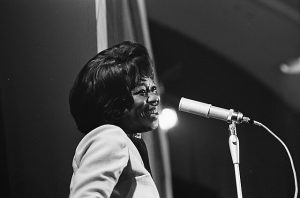Joe Williams
Jazz On The Tube Radio
Tribute
Joe Williams
Joseph Goreed was born on December 12, 1918 in Cordele, Georgia. Joe’s father wasn’t around and very early on his mother moved them into her parent’s house while saving money for a move to Chicago. Joe’s mother first made the move to Chicago and worked as a cook for a wealthy family and when Joe was four she had saved the money for him along with his grandmother and aunt to join them up north. In Chicago Williams was exposed to tons of great music being performed as well as on the radio. His mother taught him to play the piano and took him to see Louis Armstrong at the Vendome Theater and via radio he was exposed to Duke Ellington, Cab Calloway, Big Joe Turner and Ethel Waters among others. By the time Joe was a teenager he had formed a gospel vocal quartet called The Jubilee Boys that performed at church functions and other social events. By his mid teens he began performing as a solo vocalist at formal events featuring local bands. Some nights he would take home as much as $5.00 which was enough to convince his family his future was in music and he dropped out of school at sixteen. He changed his last name to Williams and began performing at the club Kitty Davis’s where he was able to sing with the band and keep tips.
By the end of the 1930s he was performing the Jimmy Noone’s band as well as Les Hite’s. In the 1940s Joe performed with Coleman Hawkins and Lionel Hampton in addition to touring with Andy Clark & His Clouds of Joy. Even at this point in his career he was supplementing his income by working the door at clubs and selling cosmetics. Williams had his first hit record on Checker in 1952; ‘Everyday I Have The Blues’. It was at the age of 35 that Joe Williams received his big break and was hired as the vocalist for the Count Basie Orchestra. Joe took over for Jimmy Rushing and became a star in his own right. In 1955 they recorded the album ‘Count Basie Swings, Joe Williams Sings’ and the tune “Alright, Okay, You Win” rose to number two on the R&B charts. Williams continued with Basie until the early ‘60s when he formed his own quartet featuring Harry ‘Sweets’ Edison in 1962. He was signed by RCA Records and his first album for the label was called ‘Jump For Joy’ with Thad Jones, Clark Terry, Snooky Young, Kenny Burrell, Oliver Nelson, Urbie Green and Phil Woods. Joe recorded a few more records for RCA before switching over to Blue Note and recording ‘Presenting Joe Williams and the Thad Jones-Mel Lewis Orchestra’ in 1966.
Joe continued to tour through the ‘70s and ‘80s and won a Grammy for Best Vocal Jazz Performance for his album ‘Nothin But The Blues’. Also during this time he landed a role on the Cosby Show as Bill’s father in law as well as was a regular guest on all the popular late night talk shows of the time. Williams toured, recorded albums and kept going strong into the 1990s until his passing in 1999. In all Williams has been nominated for eight Grammys, has been elected into the Grammy Hall of Fame, has a star next to Count Basie’s on the Hollywood Walk of Fame and won the Jazz Masters award from the National Endowment of the Arts.
“I’m most pleasantly surprised at what still comes out of my throat. I’m thrilled and thankful. I remember Edward (Duke Ellington) saying, ‘I’m just a messenger boy for God.’ Much of what we do comes through us. I thank God for what comes through me.” – Joe Williams
[tell-a-friend id=”1″ title=”Tell a friend”]





